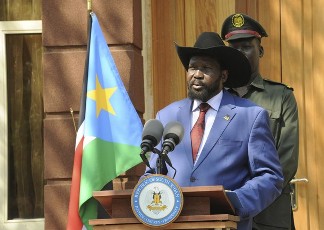South Sudanese president to unveil strategic reform plan
June 16, 2014 (JUBA) – South Sudanese president Salva Kiir will soon unveil a strategic reform plan that seeks to examine performances of specific public institutions, identifying areas that require improvements and recommendations, Sudan Tribune understands.

A draft reform plan, a copy of which by Sudan Tribune saw, identifies six priority areas, including the immediate stoppage of war to bring peace; honouring the ceasefire agreement signed with the rebels under former vice president, Riek Machar; promote national dialogue; carry out nationwide reconciliation and healing; adopt simple and measurable plans and mechanisms to fight against poverty; strengthen capacity of independent institutions; diversify the economy and enhance transparency and accountability.
“The six point plan which is being worked upon by the presidential team is a very appropriate solution to the current crisis because it has been prepared based on the realities”, a presidential aide not allowed to speak to the media on policy matter told Sudan Tribune Monday.
“The most important part of it is that it calls for an immediate end to the armed conflict and stresses commitment of the government to honour ceasefire and accept to engage in the negotiation with rebels and other stakeholders in the conflict”, he added.
What, however, remains unclear is how the presidency plans to implement these key priority areas and its intention, with observers already doubting its tangible outcomes.
SPEAKER BACKS
Meanwhile speaker of the national legislative assembly pledged support of the law-making institution to back up efforts by the government to combat corruption that still exists within the system, particularly in public service and security sectors.
The assembly, Magok Rundial said, will adopt more stringent legislation against bad tendencies in governance.
“We have to change attitude, a typical example of how horribly things can go wrong is public service. We have spent so many millions of dollars into security and public service reform projects since we became an independent state; one project after the other and you can see how people can cripple a lofty ideal and scuffle a dream that would have lifted this country out of a lot of things,” he observed.
Government’s ultimate objective, Rundial stressed, was to transform the new nation into an “ultra-modern city-state” that will shun corruption in all forms.
“The ultimate objective of the government is to make sure that even if you drop one million on the way; somebody would pick it and drop it at the police station. Honesty and the fear of God would be inculcated in the minds of our people and would be enforced by legislation,” he stressed.
(ST).
